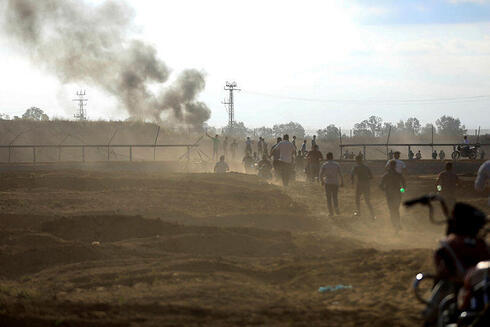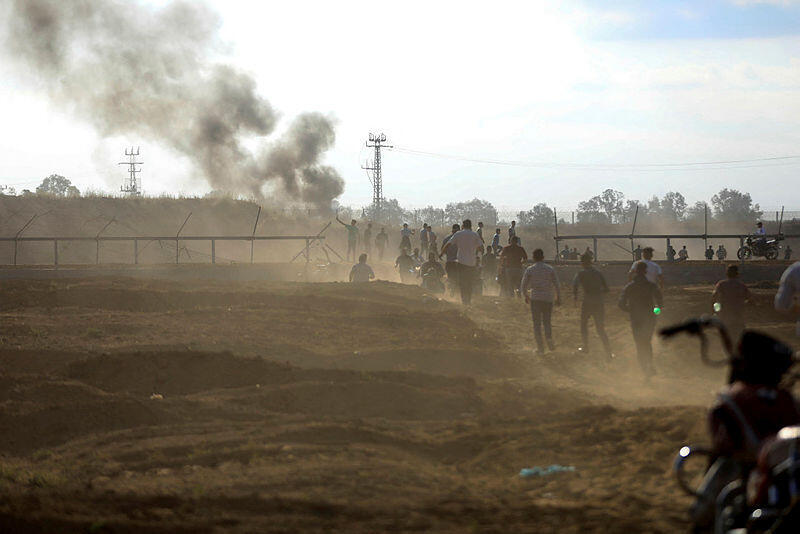
ISRAEL AT WAR
Tunnel vision: "The Gaza security fence has always been an illusion"
Geologist Yossi Langotsky, who served as an advisor to the Chief of Staff for dealing with the Hamas tunnels, has been warning for years that the reliance on the fence on the Gaza border led to complacency that allowed its breach: "A fence costing billions creates a false illusion of security"
Yossi Langotsky (89) is one of the top geologists in Israel and the one who led the discovery of the Tamar gas field. He is also a lieutenant colonel (retired), who founded the special operations branch of the Intelligence Corps, commanded the technology unit of the Intelligence Division, and won two Israel Defense Awards. In the years 2004-2005, he volunteered as an advisor to the Chief of Staff regarding the handling of the Hamas tunnels.
"For 15 years I have been warning about the problematic nature of the checkpoint system on the Gaza border, but no one listens," he says. "In the positions I held, I did not deal with the fence that surrounds Gaza, but my prolonged dealing with the problem of the tunnels led me to several conclusions, the first of which - that the construction of the fence was a fundamental mistake."
What was the mistake in building the fence?
"The mistake is that whenever you have a solution that is relatively easy to implement (dig a 15-meter-deep trench and put up a fence in it, it's not a complicated thing), it tempts people to believe that they have a solution. But there is no barrier that cannot be outsmarted. There will always be mind games here. This massive fence was built under the watchful eyes of Hamas, who saw every action and examined to what depth the barrier was being lowered into the ground. It was clear that they was studying the project, and all they needed was to find a way to be clever about it. Therefore, in my eyes, this is a blunder along the lines of the Maginot line".
Can you elaborate?
"After the First World War, which claimed many lives, the French came to the conclusion that a line of fortifications was needed on the border to protect themselves from the Germans in a future war. This line of fortifications, called the Maginot Line after the French Minister of Defense, was a marvel of technology: a system 350 km long and 20 km wide, and equipped with electronics, concrete fortifications and other seemingly impenetrable elements. And finally, in the Second World War the Germans simply bypassed the fortifications from the right and invaded France through Belgium. The Maginot Line was revealed to be folly at the highest level, which stems from the assumption that a perfect solution could be found that could not be overcome.
"In practice, what a fence like the Maginot Line does is instill confidence in the public, even if it doesn't provide results. So what did Hamas do? They disabled the observation system on the fence, brought tractors and breached the fences. Our border with the Gaza Strip is about 60 km long. The system does not seal the whole thing totally, but only parts of it, for economic reasons. Hamas saw this and said: 'Fine, we won't mess with the smart fence', they neutralized the observation system on it and bypassed it like the Germans did with the Maginot Line, only they did it from above. This is an unprecedented failure."
A continuous and more hermetic barrier would have solved the problem?
"No. If the barrier was continuous, it would be possible to breach it with enough heavy tractors, after all our forces are not deployed along every meter, but only between positions. If you know where the gaps are, thousands of people with mechanical equipment can come by surprise and break through the fence. Beyond what happened with the barrier, it seems that our defense system as a whole was also half asleep, and I am deeply ashamed of it, that we, the wise and strong Israel, with all that we invested over decades, were taken by surprise like this and at such a high price. There is no forgiveness and no excuses - it is appalling.
"The bottom line is that digging deep into the ground and building a barrier isn't true security, it is an illusion to think that a fence of billions will totally prevent an enemy from crossing. Something terrible and expensive will not solve the problem. There is no such thing as a barrier that cannot be crossed."
No solution is good enough? Is this a foregone conclusion?
"My argument is that no matter what we do, the other side will eventually find a way around it. That's why we always have to have several solutions that work at the same time. A blocking system consists of several elements: physical elements, such as a wall or a deep trench, as well as detectors that send out warnings when they are approached, as well as observations through cameras that surround the territory and also from soldiers who patrol along the fences and from units that are kept close and can jump into action quickly if necessary. That's why a barrier that costs billions is stupid, because what it mainly does is make you think that once it's erected, you're protected, and that's the end of the game.
"For this reason, when the Ministry of Finance came to me at the time and showed me the plans for the fence to ask my opinion, I said: everything is fine and dandy, but if it costs NIS 3 billion, it's stupid. It's a huge amount that can be used for other things, from building hospitals to buying airplanes."
What does a comprehensive solution for protecting the border look like?
"In my opinion, you don't need the underground barrier at all, but only sensors and things that complement them. If you have a 50 km long border, you deploy sensors and detectors along it that hear or feel when you dig or move forward, creating a kind of spider web, so that anyone who tries to pass will be recognized. But we need things that complement the sensors: patrols, physical presence of soldiers at small distances, intelligence. Don't create the illusion that concrete is enough at a depth of 40 meters and that's the end of the story."
Did you learn that from working with the tunnels?
"I deal in geology, and even in my days as the commander of the technological unit in Intelligence, we were examining geophysical methods for locating movements on the ground, such as excavations, or spaces that opened up in it. When they asked me to help with the issue of the tunnels, I had been released from the IDF for 15 years. Gadi Eisenkot, who was the commander of the Judea & Samaria Division at the time, adopted technological ideas that I proposed."
What were your recommendations?
"Among other things, I recommended establishing a dedicated tunnel administration with experts in a number of fields in order to concentrate knowledge and experience accumulated over years and not to interrupt the learning curve when positions change. I also suggested adding the Geophysical Institute to the administration's team as a senior partner, because of the various ways to discover tunnels in this area.
"The smartest thing was to harness geophysics to the fight against tunnels: to place sensors and detectors in the ground, which would warn of movements related to the ground. But this is not the ultimate solution, because there is no one ultimate solution."
If every barrier that’s erected can be overcome - what should be done now?
"Destroy Hamas. I am not bloodthirsty, I do not hate the Arabs and do not want to eliminate them, but we must restore deterrence, so that they understand that we will not stop. We are done thinking in terms of defense. If we have returned to focusing on erecting an obstacle that Hamas cannot cross - we have failed.
"If you act correctly and over time, you can at least completely suppress Hamas, if not destroy it. If you eliminate all of its economic resources, its cash flow, its weapons depots and houses - it can be paralyzed. It's like cancer - it can't always be eliminated , but it can at least be suppressed."
What should settlements prone to infiltration do?
"It is essential to urgently establish reserve units that will be on standby for defense with all the standard weapons necessary to fight the infiltration of terrorists. Such a solution could have prevented the horrific events that happened last Saturday. A platoon of 30 men, all with grenades, bazookas and machine guns, is already a fighting force. That is why we must provide weapons along all border settlements.
"How is it that they did not distribute weapons to the families in the settlements in the vicinity so that the people could defend themselves in the event of a break-in instead of praying to God for help from within their bomb shelters? How is it that until today they have not established such a spatial defense in settlements along all the country's borders? Hamas simply slaughtered them. This is more terrible than the mistakes of the Yom Kippur war. What excuse is there for that?"
Do you agree with the claim that the disengagement from Gaza in 2005 created the state of Hamas in the Gaza Strip and the escalation in the south?
"This is all nonsense. The effort to protect settlements that were in the Gaza Strip was tremendous and cost human lives. So the government rightly said, 'Let's get them out and stop this once and for all.' If we had stayed there, it would not have prevented the arming of Hamas - and I say this beyond any doubt, because this arming came from tunnels dug from Sinai to Gaza, through the Philadelphi route. From there Hamas smuggled weapons into the Gaza Strip. The settlements were not relevant to preventing this."














